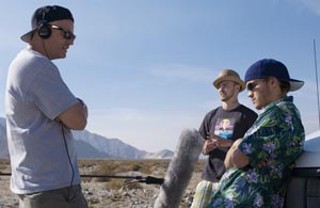At Risk
Nick Cassavetes on 'Alpha Dog'
By Josh Rosenblatt, Fri., Jan. 12, 2007

Writer, director, and crown prince of independent film Nick Cassavetes (She's So Lovely, The Notebook) is back behind the camera this month with Alpha Dog, a fictionalized account of the true life and dubious works of Jesse James Hollywood, the youngest man ever to make the FBI's most-wanted list.
Starring an ensemble cast of talented up-and-coming actors, and featuring a surprising, show-stealing turn from teen idol Justin Timberlake, Alpha Dog takes viewers inside the world of suburban gangster Johnny Truelove (Emile Hirsch) and his crew: drug-dealing kids of wealth and privilege who pattern their lives on the gangster-rap videos and mobster movies they adore. When Truelove runs afoul of unhinged junkie Jake Mazursky (Ben Foster), that fantasy world turns all too real, and the ensuing battle between the two men results in the kidnapping of Mazursky's younger brother, Zack (an exceptional Anton Yelchin). What follows is three days in Babylon, as Zack is initiated – and not unwillingly – into the gang's decadent world of drink, drugs, and girls, But as the witnesses to Zack's kidnapping pile up and the real world starts closing in, Truelove begins to believe that getting rid of the kid might be his only hope of escape.
The Chronicle recently sat down with Cassavetes to discuss the perils and rewards of putting such a sobering story on film and to find out what exactly about the movie kept him going through all those long nights of researching, writing, and shooting.
Austin Chronicle: Why did you make this movie?
Nick Cassavetes: Being a writer is kind of like being a schizophrenic. You have all these stories that you've decided you're going to write in your head, and very few of them you actually do. Everything you see could be a great story.
My kids went to the same school as the victim. They're a couple years younger. So I'd known about the story; it was a big local story in the San Fernando Valley. My kids were always talking about it. Jesse Hollywood was always on the run, so he was like an urban legend: "I saw him at the 7-Eleven, man!" But it wasn't until I was off cutting The Notebook that a buddy of mine [actor Kevin Connolly] said he knew some guys who could get me the money to make a movie. So, I started writing it, but by the time I finished, he had a gotten a job on the show Entourage, so he was busy and couldn't do the movie. I was stuck. Now I had a voluminous amount of research for this movie, and nobody wanted to make it. I had to shake down a couple of rich people.
AC: Why didn't the studios want to make the movie?
NC: Studios want to make movies where everything turns out well in the end. This one didn't really. You're holding up a kid for an hour talking about how great he is, and then you kill him. That's not really standard studio fare. It's a weird chicken-and-egg routine: Probably, if they had seen the cast we had for this movie and the price we were making the movie for, they would have all jumped on it. But you don't get people unless you have a movie, and you don't have a movie unless you have the dough, so ...
AC: What was your research process like?
NC: I went up to the Santa Barbara courthouse and got all the trial transcripts for the different kids who had been prosecuted. I went and talked to the DA. From there, I knew who the people were, and it was just a matter of tracking those people down. Unfortunately, none of them really wanted to be tracked down, and nobody wanted to talk. But I don't give up easy; I go and I beg and plead and cajole and poke my nose into the darkest corners of people's lives. I interviewed all the kids and all the ancillary players; with the one kid on death row, we wrote back and forth. As you might imagine, the differences in the stories were wild. You just have to put it together and use your best sense of what really happened.
It's a weird process of this story, because there's no good reason why this would happen. Any asshole knows that you don't take a kid and parade him around in front of 40, 50 people and then kill him and think you're going to get away with it. They got DNA, man! They got footprint analysis! Any CSI will tell you that! The amazing part about this movie is that the road had narrowed so much for these guys that they thought this was a good plan. You can't just write it all off to drugs or stupidity. You have to ask, "How did they get there?"
AC: Is going into the darkest corners of people's lives a fascination for you? Did that interest lead you to this movie?
NC: Probably. The basic map of the movie is "We're minus one kid." He'll never have a life; he'll never be able to do the things he was supposed to do. But the real interest to the movie is why it happened. I'm not sure I could tell you right now why it really happened. I have all the information, but all the information doesn't add up to something that you and I could understand. It's that journey of trying to find out the minutiae that created the kind of environment where this thing could have happened that gives the story such a complicated dynamic and makes me interested until this day. I still think back and go, "Why the hell did they do this? There must be something I'm freakin' missing."
It's horrible to go poking into the darkest corners of people's lives, but there is a certain satisfaction in getting to the truth. There's an element of fun in that, like Woodward and Bernstein. I don't know why this story is compelling. I was a kid, too. There but for the grace of God went I. I was like a lot of young people: I didn't have a lot of facility for making good decisions. And I could have easily been influenced into going really far off the beaten path. When I was growing up, it wasn't a hip-hop world, but it hasn't changed that much. All the guys are the same guys. People tell me, "This movie reminds me of River's Edge; this movie reminds me of Bully." Yeah, it probably does. They haven't gotten that pesky problem of kids adjusting to adulthood solved yet, and until they do, we're gonna keep coming up with this kind of situation.
AC: Where were you in the process when [real-life Johnny Truelove] Jesse James Hollywood was caught? Did it change your approach?
NC: Sure. We had finished shooting. I was editing. Let me just say that real life is way more important than movies. When they caught this guy, the victim's family felt great. For the family of the person that got caught, it ruined their life. I'm sure it wasn't great for the kid that got caught, either. But how it affected me and the movie was I had a movie where it said, "These events happened, these kids get caught, this guy eluded the FBI and Interpol, and no one's ever seen him again." [claps] "Good night! Drive home safe! Thank you very much!"
Then he got caught. So you write a different kind of ending to the movie, but that's not all. Now you've got to go convince the money people to spend a bunch of dough to go and reshoot some new stuff to accommodate the ending to the movie. And they say they have no money or ask you why you have to shoot more, and they grumble and moan. It's hassle and aggravation, but it all worked out fine.
Being a director is the stupidest freaking job of all time. Ninety percent of your time you're raising money, and nine percent of the time you're talking to the money, convincing them that everything's OK. And then one percent of your time you're actually making a movie.
AC: It sounds like being a congressman.
NC: Yeah, it's not a job for a grown man. ![]()










